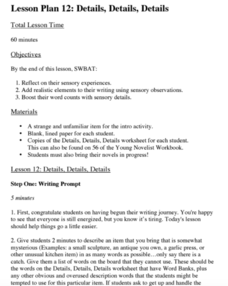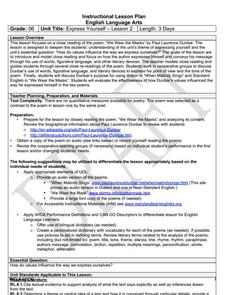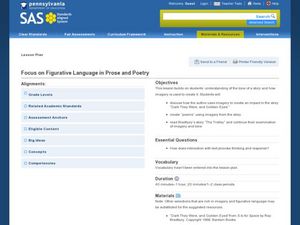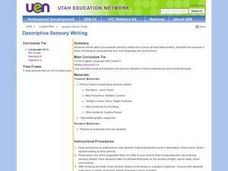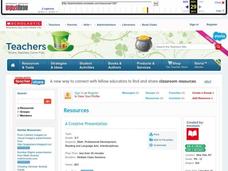Curated OER
"Snapshot" Exercises & Sensory Detail Word Bank
Read a sample of creative descriptive writing to your science class. Discuss how writing can be used to record and communicate observations that scientists make. Reading selections and thought-provoking questions are suggested. Also...
Curated OER
Focus On Figurative Language in Prose
Students examine the use of literary prose in the story, "Dark They Were, and Golden-Eyed." In this literary prose lesson, students investigate the use of imagery, metaphor, and simile in the story. They tell how author's purpose is...
Curated OER
Details, Details, Details
Writing can become one-dimensional if authors don't involve all their senses. First, scholars observe a strange object which, ideally, they can touch and even smell. Without using certain words (you can create a list or have the class...
Novelinks
Words by Heart: Guided Imagery
Sad, depressed, miserable, inconsolable, forlorn: so many synonyms have a lot of variety with their connotations. Through the guided imagery activity, writers explore the use of connotation and its influence on imagery and description by...
Curated OER
Narratives
Add to the narrative writing experience. Elementary or middle school writers listen to the teacher read a descriptive passage, then reread the same passage silently. They highlight sensory details and figurative language, then orally...
Curated OER
Metaphor
High schoolers identify the distinction between literal and figurative language with a focus on metaphors. They complete a metaphor analysis chart, then practice expanding metaphors by composing their own comparisons of elements of the...
Curated OER
The Use of Language in "I Know Why the Caged Bird Sings"
Readers of I Know Why the Caged Bird Sings are asked to craft an essay in which they compare how Maya Angelou uses figurative language to depict herself and Mrs. Flowers.
EngageNY
Grade 9 ELA Module 2: Unit 1, Lesson 9
Continue analyzing literature using textual evidence with a lesson on "I Felt A Funeral, in my Brain" by Emily Dickinson. Ninth graders bring their annotation skills and knowledge of figurative language from the previous eight sessions...
Curated OER
6th Grade: Express Yourself, Lesson 2: Close Read
The second lesson plan of a pair about Paul Laurence Dunbar, this plan focuses in particular on his poem, "We Wear the Masks." After a short historical introduction, class members conduct a series or readings, marking up the text and...
Poetry4kids
How to Write an Exaggeration Poem
The best poetry writing lesson of all time is here for you! Learn all about the art of exaggeration with a lesson on exaggeration poems, which instructs students to use wild imagery to convey their message.
Curated OER
Focus on Figurative Language in Prose and Poetry
Students place emphasis on the use of figurative language when analyzing prose and poetry. In this figurative language lesson plan, students explore the tone of a story and its imagery. Students read and discuss how the author uses...
New Class Museum
Lesson: Emory Douglas: Decoding Images and Vocabulary Activity
To better understand the work of Black Panther logo artist Emory Douglas, learners define literary devices. They define a series of words such as metaphor, simile, and assonance, then place an example of that device found in Emory...
Curated OER
Imagine That! Analyzing Imagery
Poems by O. Henry, Marion Dane Bauer, Monty Roberts, and Langston Hughes provide the text for a study of symbolism, hyperbole, and imagery. Employing the “think-pair-share” strategy learners generate definitions of these terms and locate...
Curated OER
Language Arts: Telling a Painting's Story
Use art museum paintings as inspiration for your class's creative writing works. Observing the paintings closely, middle and high schoolers list details and write descriptions. Their completed stories are displayed on bulletin boards...
Curated OER
Use of Personification and Imagery in Poetry
A reading of Theodore Roethke’s dark "Root Cellar" and Sylvia Plath’s more abstract "Mirror" launches a discussion of imagery and personification in poetry. After finding examples of personification in the poems, class members craft...
Curated OER
Descriptive Prompt: Precise Language
Incorporate sensory details into a piece of descriptive writing. First, elementary and middle schoolers improve a piece of writing by using precise, vivid language, as well as appropriate word choice. They then listen to a variety of...
Novelinks
Zach’s Lie: Guided Imagery
Close your eyes and picture a time where you decided to tell the truth to someone. What were you wearing? How did you feel? Such prompts begin a guided imagery activity for Zach's Lie. Directions for creating an environment conducive to...
Curated OER
Literary Terms
Seriously, 93 slides of literary terms? Yes, and well worth the time, although perhaps not all at once. The beauty here is in the concise, easy-to-understand definitions for such well-known terms as imagery and personification, as well...
Curated OER
Setting Worksheet
Set your class up for success with writing descriptive settings with these two graphic organizers. On the first page, writers note specifc details about their chosen setting and comment on how each character views the setting. The second...
Curated OER
Analyzing Literary Devices
Eighth graders identify figurative language and poetry in this literary analysis lesson. Using Through the Looking Glass by Lewis Carroll and a YouTube video for "The Walrus and the Carpenter," young readers complete a literary device...
Welcome to Ms Bosello's Class!
Alliteration Worksheet
Alliteration and imagery are two vital parts of any well-written poem. Encourage your young poets to include these devices with a set of activities designed to get them thinking, writing, and creating.
Curated OER
When I Set My Hat at a Certain Angle: Trying on Zora Neale Hurston's Voice to Dress-up Prose
After reading and evaluating examples of prose nonfiction by Zora Neale Hurston and other authors, high schoolers write a personal reflective essay rich in figurative language. By incorporating this strategy, they utilize voice within...
College of New Rochelle
Latin Worksheet: Horace, Ode 1.5
Take a look at Horace's "Ode 1.5" from Carmina in depth with an analysis worksheet. Included on the first page is the original Latin version of the verses as well as a literal translation. Pupils respond to questions relating to sounds,...
Curated OER
A Creative Presentation
Bring writing to life with this lesson in which elementary and middle schoolers create a display of the imagery they identify in a series of Gary Paulsen books. They read the suggested materials, identify imagery and descriptive...




